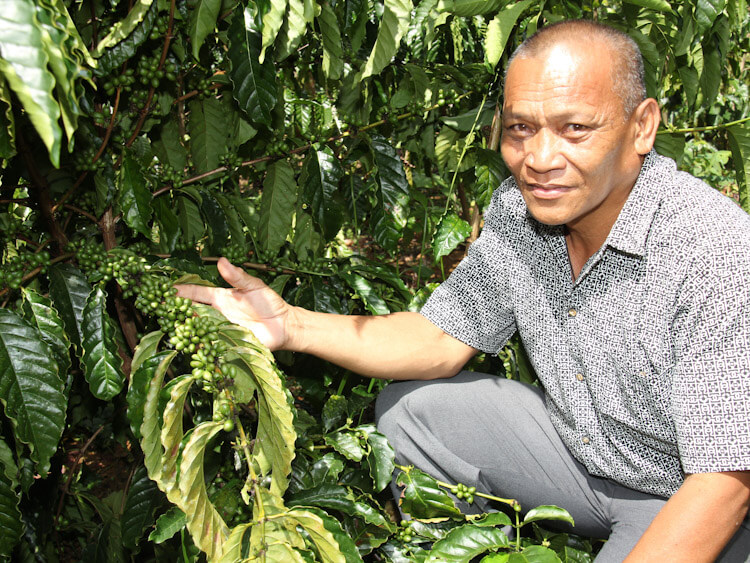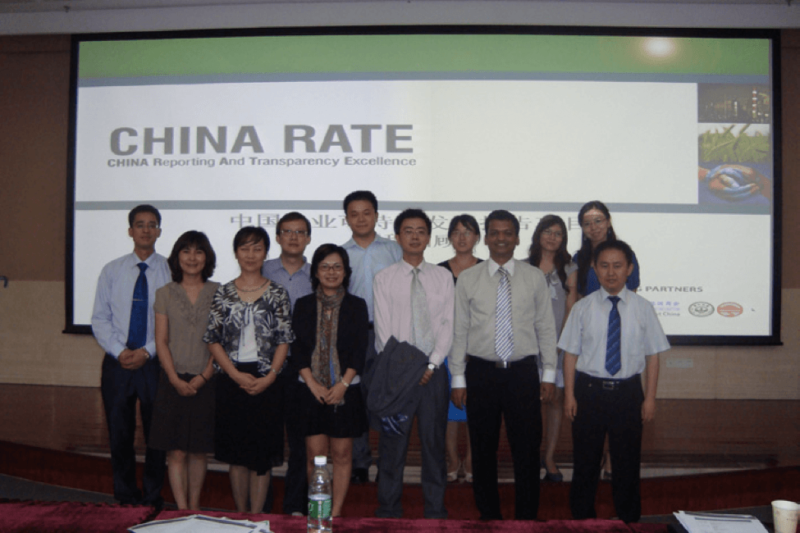Vietnam is the world’s leading exporter of pepper. While this industry exports to 97 countries, it also serves as an important contributor to the country’s economic growth, while bringing good revenue for farmers. However, this fast growth entailed challenges in enforcing appropriate food safety practices. Adverse weather conditions, pests, and diseases pushed farmers to use pesticides with poor awareness of their impact. With this, risks to Vietnam’s pepper acceptance in global markets have been identified.
ASSIST, together with Eurofins Sac Ky Hai Dang Company Ltd and DEG, launched Safe Pepper – a project that aims to increase Vietnam’s pepper export quality and improve international competitiveness. In cooperation with the Department of Agriculture and Natural Resources, beneficiary cooperatives were identified, followed by a comprehensive status quo analysis of pepper cultivation, particularly with regard to the use of pesticides and production and export patterns in Vietnam.
As a result, the project was able to engage farmers, processors, and local experts through awareness campaigns, workshops, events, and training of trainers (ToTs). Knowledge sharing on regulations and quality standards were expounded through fertilizer and land treatment courses as well as pesticide treatment courses. Moving forward, the project aims to sustain impact through developing case studies on the improvement of farmers’ income, agricultural practices and quality standards for know-how transfer.
While being under excellent topographic and meteorological conditions, the Mekong Delta serves as Vietnam and Cambodia’s orchard all year round. However, its agricultural lands are threatened by floods and increasing salinization of land as brought about by climate change. In Cambodia, a high percentage of fruits in the market are sourced from neighboring countries, posing competitive disadvantages to local fruit producers. Added deterrents are challenges in transportation, collection and marketing opportunities.
ASSIST, together with Les Vergers du Mekong and DEG, launched Sustainable Fruits Supply Chain, a project that aims to extend the fruit supply chain area in terms of capacity as well as quality. Activities included (i) training of farmers, agricultural advisers and investigators; (ii) improving logistics; and (iii) managing traceability through selection of right plants, development of existing pilot orchards and improving the utilization of organic fertilizers.
As a result, the project was able to set up a functional pilot orchard where Cambodian farm growers were trained to cultivate production of in-demand fruits such as, pineapple and guava. Collection centres that would mobilize goods were also set up in strategic locations to enhance market linkages. On top of this, assistance for the Viet Gap certification (Good Agriculture Practice) etc. was also provided by the project to ensure sustained streamlining of best practices.
In Asia, Cambodia has exhibited one of the highest rates of diminishing forest cover due to several drivers of degradation such as unsustainable and illegal logging. While consuming its forest resources not only for local use but for export to Vietnam, China and Laos, woods and timber extraction have been prevalent even in the protected areas. ASSIST together with Bureau Veritas and DEG launched PRO-FOREST – a project that aims to promote sustainable forest management and minimizing further socio-economic and environmental impact, through demonstration of FM concepts, principles and techniques.
The project carried out stakeholder awareness and capacity building events on sustainable FM systems and demonstrated compliance with regulatory requirements as well as preparation for Forest Stewardship Council (FSC)-FM Certification. Local consultants and auditors’ training and gap assessments were launched with learnings showcased during the best practices forum.
As a result of the project’s actions, collaboration with local communities and stakeholders was established. Knowledge transfer was effectively organized and representatives of local communities, experts, and local auditors were trained to implement the FSC certification schemes in Cambodia. In order to ensure project sustainability, forest owners and managers were trained in developing forest management plans while pilot communities were also oriented for the preparation of FSC certification.

Coffee production in the Philippines has been dwindling for the past 20 years albeit the increasing consumer demand. Driven by the rising consumption in emerging economies, as well as shifting preferences in established consumer markets, ASSIST together with Nestle and DEG, implemented CoFFEE – a project that aims to help smallholder coffee farmers boost production through the acquisition of new technologies on coffee farming.
Capitalizing on strategic geographies characterized by fertile plains, rolling terrain and hilly mountains, the project supplements the effort through promoting proper crop nutrition and integrated crop management (ICM) along with new fertilizer types in order to ensure quality produce. Strengthening farmers’ overall farm management capacity was also key to maximizing adopted technology. Trainings on farm budget and management, utilization of portable drying facilities, as well as transport of green coffee beans to buying stations were key knowledge sharing activities.
As a result, intensive training on key topics such as Nursery Establishment, Care & Maintenance and Plantation Establishment were given to the farmers. Part of the Training of Trainers (ToT) program also included hands-on training on coffee growing methods & technologies in Nestle´ Coffee Plantlet Production and Training Center (NCPPTC). 30,000 seedlings were distributed to be planted in the 25 hectare demo farm which also houses existing coffee trees.
China is one of the world’s largest emitters of greenhouse gases (GHGs) and a significant contributor to global warming, owing to the rapid growth of the industrial sector. Energy efficiency measures can help in reducing air pollution and generate economic benefits—thus, making it attractive to investors and energy consumers. Creating a better basis for increasing energy efficiency would help the Chinese government meet its 2020 commitment of advancing a more environment-friendly economy.
ASSIST, together with TUV Nord and DEG, developed the ACE initiative with the aim to contribute to advancing a carbon-neutral economy. The project targeted energy-intensive enterprises in four cities in China – namely Shanghai, Tianjin, Guangzhou, and Chongqing. These four locations are among the top most industrialized cities in the country, where resource-intensive industries are concentrated.
To achieve this, the key interventions include 1) conducting a multistakeholder forum; 2) creating an awareness session to highlight the alarming levels of carbon emissions in China and the practices that companies can adopt to curb this amount; 3) developing an online assessment tool for carbon footprint calculation; 4) developing training materials; 5) conducting a Train-the-Trainer workshop; 6) identifying at least 5 carbon-intensive companies and providing technical assistance to become a Carbon Neutral Company; 7) developing a case study report and; 8) conducting a best practices forum.
Sugarcane farming is one of the most important segments in Indian agriculture. Over 50 million growers find livelihood through this crop supplying to the sugar industry, for which India ranks 2nd in the world economy. Maharashtra, the largest sugarcane belt in the country, suffers from unpredictable monsoons as well as low farmer yields (80T/HA), which can be largely attributed to unsustainable farming practices such as poor irrigation, lack of proper care for the soil, use of manual labor and related costs. However, over one-third of the yield comes from medium hold sugarcane farmers, indicating that building their capacity on sustainable practices and smart mechanization will work wonders to increase the overall yield of sugarcane.
ASSIST, SDF and DEG have partnered to implement Smart 4 Green – a structured project meant to sensitize sugarcane farmers on good agricultural practices, packaged into a practical and sustainable guide and coupled with a level of mechanization, that can help enhance the sugarcane farming sector and revive livelihood in these areas. The key objectives of the project are increasing awareness on 4 feet sugarcane plantation methods, upgrading farmer capacity on sustainable farming and smart mechanization, value chain enhancement through dealer training and ensuring the presence of continued support for farmers.
This project aims to support sugarcane farmers in the adoption of sustainable practices and smart mechanization through numerous interventions and partnerships with local academic institutions, government agencies, and financial service providers. A Farmer Help Centre for sugarcane farmers will be set up to provide continuous support and consultation. Pilot demonstration farms using the improved operations will be established, closely monitored and showcased for the sugarcane farmers who will also be undergoing training sessions. By the end of this project, sugarcane farmers in Maharashtra will understand the benefit and utilize advanced farming practices and mechanization, strengthening India’s sugarcane value chain and the overall agricultural sector.
Current patterns of energy consumption will lead to increased demand for thermal energy by almost 700% by 2050 when compared to 2005 levels. At the same time, the number of buildings is expected to manifold by 40% which contribute significantly to the increased energy usage. In order to minimize the energy use, we need to maximize the savings by implementing a sustainable Building Management System (BMS) in buildings, which will better manage as well as improve energy usage and performance, through the use of hardware, information, and data.
To achieve these objectives, the project focuses on creating awareness among business owners and decision makers about the importance of sustainable BMS implementation; attempts to enhance capacity among local facility technicians through establishment of state-of-the-art BMS training facility and up-skilling through targeted trainings; and implements pilots as showcases for sustainable BMS at prominent buildings in varied sectors to strengthen awareness.
Currently, CII-GBC, the home of Indian Green Building Council (IGBC) hosts one pilot solution while another IT company in Chennai called Aspire Systems hosts the second pilot – exhibiting significant savings and GHG reduction through a strong BMS solution. Furthermore, the training centre has been established at and in partnership with Dr. Ambedkar Institute of Productivity (AIP) – National Productivity Council (NPC), Chennai, a prestigious central government institute under the Ministry of Industry & Commerce, Government of India – paving way for practical learning, sustained operations and affordable up-skilling among technicians.

China is among the top three countries in the world with regards to the size of its economy and success of its business. When it comes to the quality of services and products, Chinese organizations are considered world class. However, up to date one aspect of conducting business has not reached wide popularity, namely corporate sustainability reporting. The project China RATE sought to initiate the spread of corporate social and environmental reporting amongst manufacturing and service industries in China. It hoped to raise awareness and optimize the reporting procedures of Chinese companies to make their businesses more sustainable. By training organizations on issues such as transparency, environmental responsibility and international GRI guidelines, it aimed to enable them to create a better long-term approach which would lead to greater success and profits.
ASSIST, in partnership with TUV Rheinland, conducted awareness raising sessions with company CEOs, trained local companies on GRI guidelines and provided technical consultancy to selected companies on GRI implementation. The awareness raising activities targeted top decision makers to ensure company commitment to corporate sustainability reporting. Fifty participants from different companies in China attended a series of training on GRI standards, international and local standards as well as on local carbon strategies. These trainings built the local capacity of these participants to become trainers themselves and spread their knowledge among industry partners. Finally, the project gave five companies intensive consultancy on GRI guidelines and helped them with their sustainability reporting.
Global Initiatives organizes annual forums on responsible business and in 2015 held the Responsible Business Forum on Food and Agriculture in Hanoi, Vietnam. Under the theme ‘ASEAN Beyond 2015: Collaboration for Equitable Growth’, the forum convened more than 350 leaders from business, government, scientific research institutes and NGO communities, to discuss the future sustainability of aquaculture, coffee, dairy, maize, rice and tea value chains. ASSIST ran a workshop for Global Initiatives, facilitating the formulation of action points and next steps for these agriculture products.
ASSIST’s working group at this forum produced actionable recommendations for successful public-private partnerships, increasing productivity, improving rural livelihoods, reducing poverty, and reducing environmental impacts. A key highlight of the form is a dialogue with ASEAN government Ministers on sustainable agriculture and boosting productivity in Southeast Asia.



